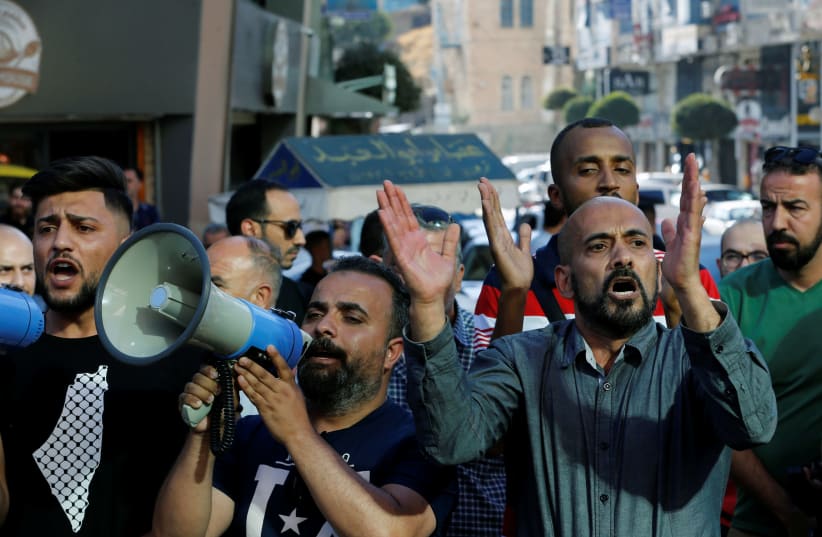The Palestinian Authority commission of inquiry into the death of political activist Nizar Banat is expected to publish its findings within the next 48 hours, as Palestinians continued to protest his alleged killing by PA security forces.
Banat, 44, died during a raid on his home in Hebron by PA security officers last Thursday. The PA has not provided any details about the circumstances that led to his death.
Eyewitnesses claim that Banat, an outspoken critic of the PA leadership, was beaten to death by more than 25 officers who came to arrest him.
Banat’s death has sparked a wave of unprecedented protests in the West Bank, especially in Ramallah, where many Palestinians have been demonstrating against PA President Mahmoud Abbas and the PA security services.
PA officials have accused Hamas and ousted Fatah leader Mohammad Dahlan, who is based in the United Arab Emirates, of exploiting the death of the activist to incite Palestinians against Abbas and the Palestinian leadership.
Denouncing the alleged “assassination” of Banat, Hamas and Dahlan have called on Palestinians to take to the streets to protest against Abbas and the “repressive” measures of the PA security forces.
Hours after the death of Banat was announced by Jibreen al-Bakri, Hebron’s Palestinian governor, PA Prime Minister Mohammad Shtayyeh formed a committee to investigate the circumstances surrounding the incident. The committee is headed by PA Justice Minister Mohammad al-Shalaldeh.
On Monday, in his first public statement on the incident, Shtayyeh said the commission of inquiry “is doing its work with all professionalism and transparency to clarify the truth and put matters in perspective within the framework of Palestinian law.”
Shtayyeh, who was speaking during the weekly meeting of the PA cabinet in Ramallah, said those who are found to be connected to the death of Banat will be referred to the judicial authorities. His remarks were seen as an attempt to calm the situation after days of protests.
He emphasized the right of Palestinians to freedom of expression, “according to democratic principles, which are part of the culture of our people.”
Shtayyeh also affirmed respect for the independence of the judiciary and its decisions, as well as respect for the freedom of the press and media, urging Palestinians “to demonstrate a spirit of high responsibility and not to distort the matter in favor of political agendas and paid defamation campaigns.”
In an implicit reference to the anti-PA demonstrations, Shtayyeh called on Palestinians to direct their “national effort against the occupation and its colonial tools in Jerusalem and Palestine.”
Meanwhile, several Palestinian journalists held a sit-in strike in front of the Office of the United Nations High Commissioner for Human Rights in Ramallah to demand international protection after they were assaulted by PA police officers and Fatah activists while covering the protests over Banat’s death.
The journalists said many of them were subjected to physical and verbal abuse and had their cameras smashed and cellphones confiscated by PA security officers and Fatah members.
Palestinian human-rights groups denounced assaults “by uniformed and non-uniformed security personnel” on participants in recent peaceful assemblies.
“Using excessive force, security officers beat with batons, stoned and dragged protesters along the ground,” the groups said in a statement after an emergency meeting in Ramallah.
“They fired tear-gas canisters intensively while civilians were in the city center [of Ramallah],” they said. “Attacks affected journalists, who were beaten and had their equipment seized. Security personnel obstructed the work and confiscated cellphones of field researchers at human -rights institutions.”
The groups said uniformed security personnel did not intervene to protect and stop the “aggression” on the protesters by non-uniformed security officers.
“Human-rights groups underline that the rights to freedom of peaceful assembly and expression must be respected as constitutional rights, ensured by the Palestinian Basic Law and international human rights conventions,” they said. “Abuse of these rights reflects a constitutional crime and a grave breach of the Palestinians’ obligations arising from accession to international conventions.”
